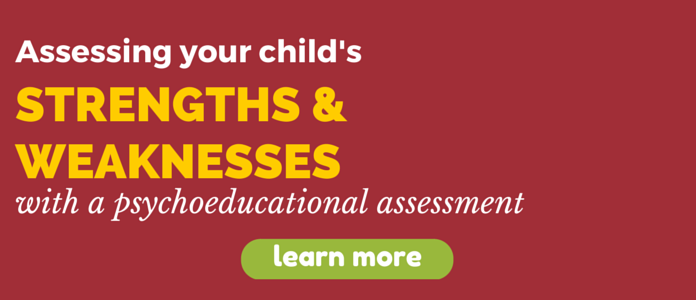While we are all different in the responsibilities that we manage and how we spend our time, we all share the fact that we have daily tasks to complete. We are able to move through these tasks and function in a productive way thanks to a set of skills called executive functions. Executive functions are like the CEO of the brain. They are what enable us to plan and carry out goals, by delegating resources and making sure we complete our tasks on time. These skills are required from the planning stage of a task, through to the completion of that task.

Different executive skills are involved in the planning, initiation, and completion of any given task. Combined, these abilities allow us to think of what we have to do, make a plan for how we will get it done, and complete the task in the most efficient way. They allow us to have the foresight to anticipate problems, and allow us to react to the problems that we didn’t anticipate. They allow us to be productive, and facilitate the success in any goal you may have set for yourself.
Children too have their own tasks to complete throughout the day!
When children have weaknesses in their executive functions, it’s as though they are working without a manager. Small tasks that involve planning, organization, or memory—like cleaning their room—can become more challenging without the skills to facilitate the process, and completing the task in the most organized, timely manner. Some executive function deficits can lead to becoming distracted easily, and not staying on task, while others can lead to leaving the task to the last minute, and not spending as much time on the task due to poor time management.
But what are these executive functions?
Executive functions are a set of mental skills that allow us to organize information, draw on past experiences, and complete tasks. There are several skills involved in executive functioning, and weaknesses in different skills can impact your child’s performance when completing tasks in different ways. These skills include:
- Impulse Control: the ability to think before acting. Children who struggle with this skill often have difficulty following rules and do things before thinking about them. They may quit a task prematurely to do something they want to do more, may disrupt the classroom, or may even do something dangerous because they haven’t thought through the consequences.
- Working Memory: the ability to keep something in your memory while performing more complex tasks. Children who struggle with working memory have difficulty with completing multiple steps. They may have difficulty taking notes in class, or may ask you to repeat an explanation because they didn’t understand it the first time.
- Emotional Control: the ability to manage emotions to control and direct behaviour. Like the name suggests, children who struggle with this skill have a difficult time controlling their behaviour when they become upset or excited. This means they may have difficulty completing a task, or have a hard time hearing negative feedback, as they often focus on the emotion as opposed to the end goal.
- Sustained Attention: the ability to maintain attention on a task despite distraction, fatigue, or boredom. Children who struggle with sustained attention often have difficulty following through with a task to completion.
- Task Initiation: the ability to get started on projects without delay. Children who struggle with this skill often don’t know where to start with a task. While it may appear that they are procrastinating, this usually stems from the lack of a plan, and inaction due to being overwhelmed with the task.
- Planning/Prioritization: the ability to create a path to completing a goal, and making decisions on where to focus your attention. Children who struggle with this skill often become overwhelmed with the task at hand, and have trouble breaking a larger tasks into smaller, less intimidating steps.
- Organization: the ability to use systems to track information and materials. Children who struggle with organization often misplace things, and have a difficult time correcting their behaviour even in the face of negative consequences that arise from disorganization.
- Time Management: the ability to estimate how much time you have, and how to best allocate your time to complete a task within that timeframe. Children who struggle with time management often underestimate the amount of time tasks will take, and may be left scrambling to complete the task at the last minute.
- Flexibility: the ability to adaptable to changing conditions, and revise plans if necessary. Children who struggle with flexibility have a difficult time changing course when they encounter setbacks or unexpected roadblocks. When they are required to adapt to changing circumstances, they may become panicked or frustrated.
- Self-Monitoring: the ability to be aware and understand your own thought processes and strategies to completing a task. Children who struggle with this skill may not even be aware that they have strategies, or have difficulty determining if their strategies are actually working.
When children have weaknesses in their executive functions, it’s as though they are working without a manager.
Signs of Executive Skill Weaknesses
It’s important to understand that executive function skills develop at different points during a person’s life. This is why it’s always a good idea to for parents and educators to adjust their expectations based on the child’s age with respect to what they should be capable of at that particular developmental stage. Despite the age of development, most problems with executive functions become evident and start to present themselves when the child starts elementary school. During this transition, it’s easier to compare their relative skills to a large group of children their age and see their ability to use those skills within the context of the sudden requirement of completing independent work.
Your child may have weaknesses in one or more of their executive functions if they’ve been experiencing difficulty with:
- Planning long-term projects
- Allocating appropriate time to certain tasks, including after-school activities, homework and chores
- Remembering events or responsibilities that deviate from the norm
- Keeping track of personal belongings and/or home work materials and assignments
- Initiating activities without procrastination
Problems with Executive Functions
As mentioned before, executive functions can develop at different stages and ages in our lives, and some people are simply born with weaknesses in these areas. Sometimes these weaknesses are minor and sometimes they are profound. Problems with executive functions are typically seen in children and adults who are diagnosed with ADHD, some types of Learning Disabilities, and brain injury. However, people can also have executive function deficits without being diagnosed with ADHD or LD. In either case, understanding the specific skills that are lacking and the role executive functions play in self-regulated behaviour helps determine the areas that need extra support. And understanding where your child needs support is the first step in helping them succeed.
Developing and Supporting Execution Skills
The best way to determine your child’s strengths and weaknesses in their executive functions is with a comprehensive psychoeducational assessment. The assessment involves a number of different tests and questionnaires that examine your child’s abilities in all of the executive function skills listed above. Based on these results, tailored recommendations can be made for how parents and teachers can assist the child at school and at home, as well as develop those skills.
Your child’s brain CEO might be a bit scattered right now, but it doesn’t mean they’re not smart.
The good news is that executive skills can be taught, weaknesses supported, and full potential realized!

